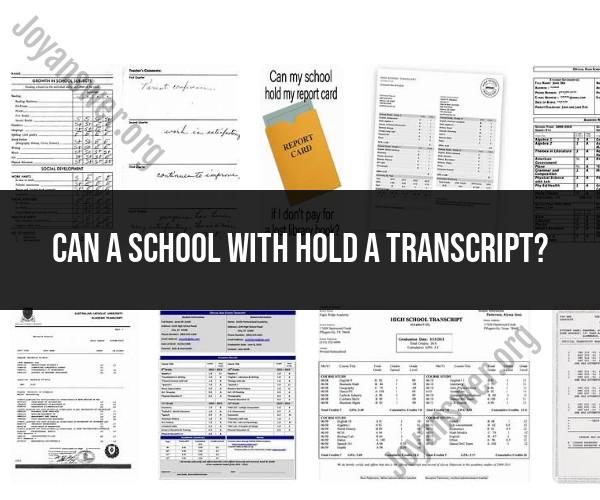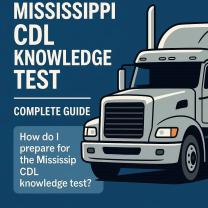Can a school with hold a transcript?
Schools, colleges, and universities typically have policies in place that govern the release of transcripts. While the specific policies can vary between institutions, here are some general considerations regarding whether a school can withhold a student's transcript:
Unpaid Financial Obligations: One common reason for schools to withhold transcripts is if a student has unpaid financial obligations to the institution. This may include unpaid tuition, fees, library fines, or other outstanding balances. Schools often require these financial obligations to be settled before releasing transcripts.
Academic or Administrative Holds: Some schools may place holds on transcripts for academic or administrative reasons. For example, a student who has not fulfilled certain academic requirements, has disciplinary issues, or has not returned borrowed library materials may have a hold placed on their transcript until the issues are resolved.
Pending Disciplinary Action: In some cases, schools may withhold transcripts if a student is facing disciplinary action. This might occur when a student is under investigation for academic misconduct or other violations of the school's code of conduct.
Failure to Return University Property: If a student has borrowed equipment or property from the university, such as laboratory equipment, library books, or school-issued devices, the school may withhold transcripts until these items are returned.
Outstanding Student Loans: While not directly related to the school, federal student loans may be in default or delinquent, and a school might be prohibited from releasing transcripts in such cases. However, this is typically a legal requirement rather than a school policy.
It's important to note that withholding transcripts should be done in compliance with applicable laws and regulations. Schools should communicate the reasons for withholding transcripts and provide students with opportunities to address and resolve any issues.
Students generally have certain rights, and schools must adhere to specific guidelines when withholding transcripts. It is advisable for students to:
- Communicate with the school to understand the reason for the transcript hold and work on resolving the issue.
- Seek information about the school's specific policies and deadlines for resolving the hold.
- If needed, consult with the school's registrar's office, financial aid office, or student affairs office for assistance in addressing the situation.
If a student believes that a school is unjustly withholding their transcript, they may need to seek legal counsel or mediation to resolve the matter. It's important to maintain open communication with the school to address any concerns and work toward a resolution.
Can a School Withhold a Transcript? Understanding Your Rights.
In general, schools cannot withhold a student's transcript for financial reasons. This is because transcripts are considered to be the property of the student, and schools have a duty to provide students with their academic records.
However, there are a few exceptions to this rule. For example, schools may be able to withhold transcripts if a student has outstanding financial obligations to the school, such as unpaid tuition or fees. Schools may also be able to withhold transcripts if a student has violated the school's code of conduct.
Legal and Ethical Considerations in Transcript Withholding.
There are a number of legal and ethical considerations that schools must take into account when withholding transcripts.
On the legal side, schools must comply with all applicable laws and regulations. In the United States, the Family Educational Rights and Privacy Act (FERPA) protects students' privacy rights and guarantees students access to their academic records. FERPA also prohibits schools from withholding transcripts for financial reasons.
On the ethical side, schools must consider the impact that transcript withholding can have on students. Transcript withholding can prevent students from transferring to other schools, applying for jobs, or receiving financial aid. It can also cause students significant emotional and financial hardship.
Resolving Transcript Issues and Disputes with Educational Institutions.
If you are having trouble obtaining your transcript from a school, there are a few steps you can take to resolve the issue:
- Contact the school's registrar or admissions office. They should be able to tell you why your transcript is being withheld and what you need to do to get it released.
- If you are unable to resolve the issue with the school, you can file a complaint with the U.S. Department of Education. The department will investigate your complaint and try to help you resolve the issue with the school.
- If you are still unable to get your transcript released, you may need to seek legal help. A lawyer can advise you on your rights and options.
Ensuring Access to Your Academic Record: Steps to Take.
There are a few steps you can take to ensure that you have access to your academic record:
- Request copies of your transcripts from all of the schools you have attended. Keep the copies in a safe place.
- Make sure that your transcripts are complete and accurate. If you find any errors, contact the school to have them corrected.
- Consider using a transcript service to store and manage your transcripts. Transcript services can provide you with access to your transcripts 24/7 and can make it easier to send your transcripts to schools and employers.
Advocating for Transcript Release and Transparency.
There are a number of advocacy groups that are working to ensure that all students have access to their academic records. These groups are working to change laws and regulations to make it more difficult for schools to withhold transcripts.
You can also advocate for transcript release and transparency by sharing your story with others and by contacting your elected officials.
Transcript withholding is a serious issue that can have a significant impact on students' lives. By understanding your rights and taking steps to protect your academic record, you can help to ensure that you have access to the opportunities you deserve.













